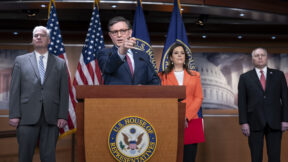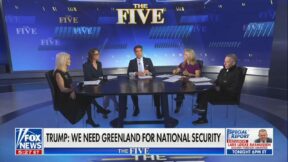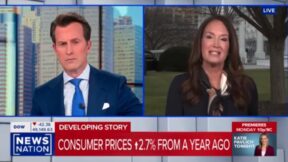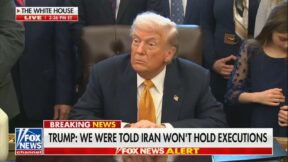‘Why Not Just Condemn It?’ Mamdani Refuses to Condemn ‘Intifada’ Slogan Three More Times to Kristen Welker
NBC’s Kristen Welker asked New York Democrat Zohran Mamdani several times and several ways about condemning the phrase “globalize the intifada” that is often heard at protests, but the self-described Democratic-Socialist, who won the Democratic primary in the NYC mayoral race, continued to refuse to do so on Sunday.
Mamdani appeared with Welker on the latest Meet the Press from NBC News following his upset win over former New York Gov. Andrew Cuomo, and the wake of multiple controversies surrounding his past comments on issues involving race, anti-Semitism, and Israel, as well as his socialist views and President Donald Trump referring to him as a communist.
At one point during the mostly friendly and extensive interview, Welker brought up an ongoing controversy over Mamdani’s refusal to condemn the phrase “globalize the intifada” when asked about it on a podcast recently. The slogan is one of several that are considered to be in support of violence against Israel and Jewish people around the world.
The candidate was asked about anti-Semitism from the left in general and at anti-Israel protests in particular, and specifically the intent of the slogans “globalize the intifada” and “from the river to the sea” in those contexts.
Mamdani responded that he doesn’t like the idea of “banning” words or phrases — which was not the question — and that doing so is more something that President Donald Trump would do.
He was then asked whether the phrases make him “uncomfortable,” to which he replied that he feels the two slogans are not of the same character, but added, “to me, ultimately, what I hear in so many is a desperate desire for equality and equal rights in standing up for Palestinian human rights.”
He also claimed that the word “intifada” has “been used by the Holocaust Museum when translating the Warsaw Ghetto Uprising into Arabic,” a comment that drew a fierce and direct rebuke from The United States Holocaust Memorial Museum.
In her question on the subject, Welker did not bring up the Museum or the specific details of his comment, or subsequent public comments from fellow Democrats including Sen. Kirsten Gillibrand, but instead introduced the subject by saying it’s something that has “divided some New Yorkers in recent weeks.”
“You were recently asked about the term ‘globalize the intifada,’ if it makes you uncomfortable. In that moment you did not condemn the phrase,” Welker said. “Now, just so folks understand, it’s a phrase that many people hear as a call to violence against Jews. There’s been a lot of attention on this issue, so I want to give you an opportunity to respond here and now.”
“Do you condemn that phrase ‘globalize the intifada?'” she asked.
Mamdani said it’s not “language” that he uses, and that he believes “freedom and justice and safety are things that, to have meaning, have to be applied to all people, and that includes Israelis and Palestinians as well.”
Welker then asked a second time.
“But do you actually condemn it?” she said. “I think that’s the question and the outstanding issue that a number of people, both of the Jewish faith and beyond, have. Do you condemn that phrase, ‘globalize the intifada,’ which a lot of people hear as a call to violence against Jews?”
Mamdani replied that it’s not the role of the mayor to “police” speech — which was not the question — and brought up Trump.
Welker asked a third time, saying, “But very quickly, for the people who care about the language and who feel really concerned by that phrase, why not just condemn it?”
“My concern is to start to walk down the line of language and making clear what language I believe is permissible or impermissible takes me into a place similar to that of the president, who is looking to do those very kinds of things,” Mamdani replied. “Ultimately, it’s not language that I use. It’s language I understand there are concerns about.”
Democratic Leader Rep. Hakeem Jeffries was also asked about Mamdani’s comments during his interview for ABC’s This Week, and said that Mamdani will have to “clarify” his position on the “not acceptable” phrase.
WELKER: I want to ask you about an issue that has divided some New Yorkers in recent weeks. You were recently asked about the term “globalize the intifada,” if it makes you uncomfortable. In that moment you did not condemn the phrase. Now, just so folks understand, it’s a phrase that many people hear as a call to violence against Jews. There’s been a lot of attention on this issue, so I want to give you an opportunity to respond here and now. Do you condemn that phrase “globalize the intifada?”
MAMDANI: That’s not language that I use. The language that I use and the language that I will continue to use to lead this city is that which speaks clearly to my intent, which is an intent grounded in a belief in universal human rights. And ultimately, that’s what is the foundation of so much of my politics, the belief that freedom and justice and safety are things that, to have meaning, have to be applied to all people, and that includes Israelis and Palestinians as well.
WELKER: But do you actually condemn it? I think that’s the question and the outstanding issue that a number of people, both of the Jewish faith and beyond, have. Do you condemn that phrase, “globalize the intifada,” which a lot of people hear as a call to violence against Jews?
MAMDANI: I’ve heard from many Jewish New Yorkers who have shared their concerns with me, especially in light of the horrific attacks that we saw in Washington, D.C. and in Boulder, Colorado about this moment of antisemitism in our country and in our city. And I’ve heard those fears and I’ve had those conversations. And ultimately, they are part and parcel of why, in my campaign, I’ve put forward a commitment to increase funding for anti-hate crime programming by 800%.
I don’t believe that the role of the mayor is to police speech in the manner, especially of that of Donald Trump, who has put one New Yorker in jail, who’s just returned to his family, Mahmoud Khalil, for that very supposed crime of speech. Ultimately, what I think I need to show is the ability to not only talk about something but to tackle it and to make clear that there’s no room for antisemitism in this city. And we have to root out that bigotry, and ultimately we do that through the actions. And that is the mayor I will be, one that protects Jewish New Yorkers and lives up to that commitment through the work that I do.
WELKER: But very quickly for the people who care about the language and who feel really concerned by that phrase, why not just condemn it?
MAMDANI: My concern is to start to walk down the line of language and making clear what language I believe is permissible or impermissible takes me into a place similar to that of the president, who is looking to do those very kinds of things, putting people in jail for writing an oped. Putting them in jail for protesting. Ultimately, it’s not language that I use. It’s language I understand there are concerns about. And what I will do is showcase my vision for this city through my words and my actions.
Watch the clip above via NBC News.





Comments
↓ Scroll down for comments ↓